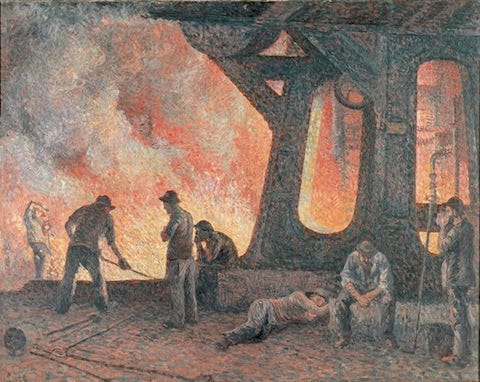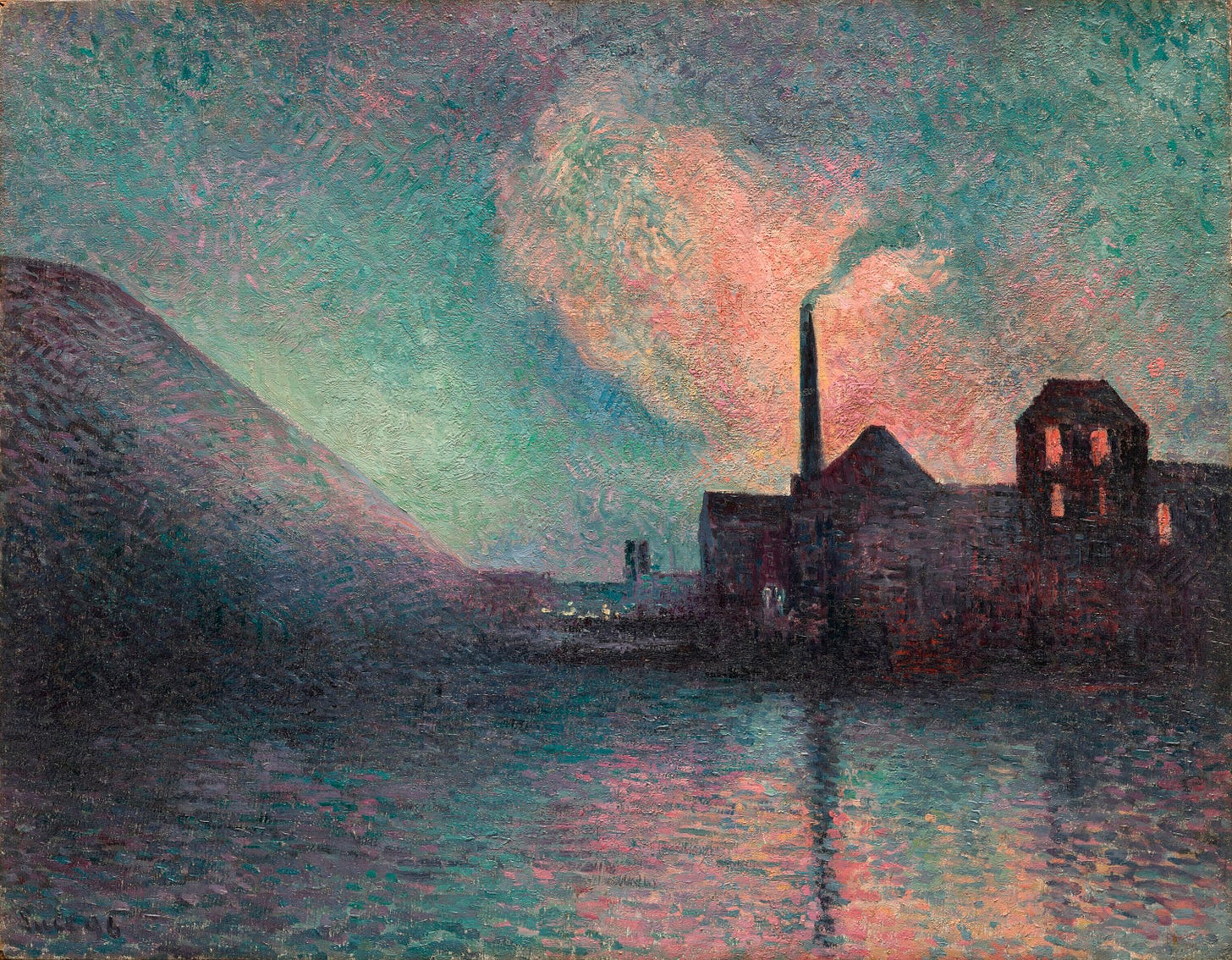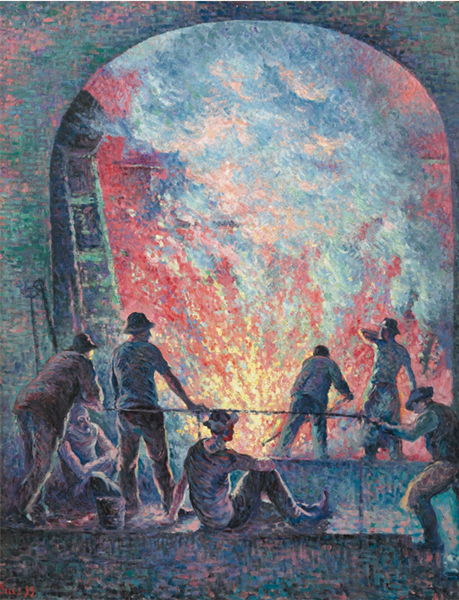Disruptive Spirituality: A Fire that Purifies
We need saints in the caves, but we need many more inside the Machine
For today’s post I’m unlocking and re-sharing a piece I wrote last year on disruptive spiritual practices. The piece turned out to be one of my most popular essays (thanks to ’s share), and if you haven’t read it, or if you’ve read it and forgotten it, I hope it speaks to you, and offers hope that the small disciplined work of cultivating our own soul isn’t just magical thinking, self-optimization or reality avoidance, but can have a meaningful impact on the world outside our heads.
To be trapped inside a machine is frightening, especially when it catches fire.
Once, as a boy, I was on a Yugoslav airline when one of the engines began shooting flames as the aircraft prepared for takeoff. I had a window seat and could see the fiery turbine under the wing a few feet away, as if a giant blow torch had been ignited within its whirling interior.
I should have been horrified that an explosion was imminent, but being a boy I instinctively felt immortal, like all children, and only experienced puzzlement and wonder. We were forced to spend the night in Ireland while the aircraft was repaired, which brought the bonus of staying in a hotel and riding a double-decker bus for the first time.
The next day we were airborne again, and I was back at the same window, no more troubled than the day before. When the long transatlantic flight finally neared its end, and the plane began its descent, I heard a murmuring voice behind me, and then another and another, all of them murmuring in unison in the dim cavernous light of the cabin:
Hail Mary,
Full of Grace,
The Lord is with thee.
Blessed art thou among women,
and blessed is the fruit
of thy womb, Jesus.
Holy Mary,
Mother of God,
pray for us sinners now,
and at the hour of our death.
Soon it seemed half the cabin was reciting these words as our socialist aircraft dipped and swayed on the air currents. It did not occur to my young immortal mind that many of the passengers had been anxious ever since takeoff, fearful that our aluminum flying machine might, after all, explode over the North Atlantic.
The praying passengers were likely from the northern Catholic regions of Yugoslavia, whereas my family of origin hailed from the old Byzantine lands in the south, which were (and still are) Orthodox. I had never heard the Hail Mary prayer, at least not in English, since our services were never in English.
Still, those chanted words struck me as powerful; not powerful in the sense of comforting—I did not need comforting just then—but powerful in the sense of strange and other-worldly.
Prayer is often associated with comfort and peace or connecting with the divine. But prayer is also a disruptive practice. It breaks through the ordinary pattern of daily behavior and shifts the focus of attention from the particular to the eternal.
Prayer is divine technology: an alignment of the signals of a human creature with the signals of the Creator. This technology works outwardly, altering our external behavior, but also inwardly, redirecting the flow of thoughts and feelings.
We have a habit, say, toward fear or anger or pornography, or whatever haunts our conscience or unsettles our spirit. Prayer disrupts these tendencies and turns us away from them, so that when the anger or fear creeps up again, or we feel temptation coming on, we are more ready, more able, to deal with it, more ready and able to re-align the flow of our spirit.
Prayer is disruptive, but so is the Machine. There is the outward disruption, in the form of devices and ChatGPTs and simulations, and—like prayer—an inward disruption.
The tools of the Machine invite us into their own rhythms and patterns: the incessant checking of messages, the compulsive need to know what is happening “out there” in the world or “over there” on that platform. But the real happening is “right here”, in and around our bodies.
We cradle the tools of the Machine. We brush their glassy faces and keep them closer than our own children. We allow the tools to direct our thoughts and emotions, to shepherd the flow of our neurochemistry and our spirit. We feel helpless when we try and break away, suddenly discovering we are addicts, or else possessed by some diabolical digital spirit.
I have served as a godparent in an Orthodox baptism, and one of the most unusual moments was when the priest asked me this question as I held the baby: “Do you renounce Satan, and all his angels, and all his works, and all his service, and all his pride?”
He asked this question three times, and three times I had to answer yes. Even stranger, after answering I was required to turn away toward the door of the church (away from the sanctuary) and to spit.
Yes, to spit. It was not a vigorous spitting, though. It was more like blowing (actually it was a bit of both). I was in my twenties at the time, cool and irreligious and still inclined to think myself immortal. I went along with it, superstitious as it seemed, because this is the way it had always been done in the old Byzantine hills of my parents’ village, and I was trying to be respectful to my family and to “tradition”.
Now that I am older and more vulnerable, I see things a bit differently. Behind that weird ancient tradition is a recognition that some things are just so destructive that it is not enough to acknowledge them with a verbal statement. Some things must be rejected viscerally, with our whole being.
Imagine responding to the internet this way? Do you renounce internet, and all its tools, and all its works, and all its services, and all its pride?
Yes, yes, and yes!
If it were only so easy.
We may not go so far as to spit at our smartphones (well, you are free to do so if you wish). But our response to the tools of the Machine must go beyond words and analysis, and disrupt the way we, as whole beings, engage with the world around us. Prayer and other spiritual practices help us do that, in ways that nothing else can, for nothing but spirituality can reach into the deepest and total sense of who we are.
Christianity is not the only religion capable of disruptive spiritual practice. A few months ago, I was driving past a local woodland in the autumn twilight when I spotted a vehicle ahead, half parked in a ditch, and a man unrolling a mat on the sidewalk beside the trees.
It was a damp night with a fine mist in the air; not raining, yet wet and cool, not a night to be bowing beside an obscure roadside in the direction of Mecca. The praying man, whoever he was, was almost as surprising a sight as if a fox or coyote had emerged from the shadows to observe the headlights of the passing traffic.
I would have been equally struck if I saw an elderly Asian man doing Tai Chi on the same mat that night, or a non-religious person with her legs crossed, reading Pride and Prejudice in the glow of an oil lamp.
I am not suggesting that Tai Chi, Islamic, Christian and bizarre British literature practices are basically “the same” because they can both disrupt the ordinary flow of daily life; but I am suggesting that spiritual practices in the age of the Machine might not have much impact on us, or on the world around us, unless they disrupt that flow in discernible ways that pull us out of the Machine and ground us in a more organic reality.
In my last essay I explored how emerging technologies capture both hemispheres of the brain: the left hemisphere, which perceives through abstract words, parts, and analysis, and the right hemisphere, which perceives experientially, wholistically, and emotionally.
Disruptive spirituality does the same, but in the opposite direction of the Machine: Tweets and media are replaced by prayer and holy readings, and virtual worlds are replaced by a sacred imagination and holy silence.
But there is something else the Machine brings, and this also needs to be countered: conviction. The power and ubiquity of technology makes us believe in its metaphors.
Tesla used to construct the rear-underbody of some of its vehicles with 70 separate parts, each of which had to be pieced together by robots and humans. Now it uses a 430-ton Giga Press to do the same job. The Giga Press pumps liquified molten alloy into a mold, clamps it shut till it hardens, and then presto, out comes a rear-underbody, a single piece that is perfect, exact, technically beautiful.
This marvel of engineering will make electric cars cheaper, but it is the wrong metaphor for a human being. And yet, after more than a hundred years of factory systems, the factory model has become a natural metaphor for how we understand human life, to the point that we are now okay with leaping into the factory fire to liquify our values, our language, how we educate our children, and pumping them into the prescribed molds until they cool and harden into new values, new words, new ways of being.
Fluid modernity leads to mechanical reality. This molten-mechanical metaphor might be material and dead, but we believe in it because it is our underbody and feels almost natural. A more powerful metaphor is needed—not a metaphor but a story—to give us reason to resist.
Some of us already live by spiritual stories that are more powerful than the Machine metaphor. Some of us will not discover our stories until we have suffered enough in the cultural Giga Press. Sometimes pain leads to conviction; sometimes the fire does not destroy but purifies.
What story is lifegiving? What story puts me in a right relationship with other human beings and the natural world? What story matters so much that I am willing to risk everything for it? What story am I willing to sacrifice my life for?
The Machine metaphor is powerful, yet the story behind it is empty. Factories make anything and everything. They make whatever. “Whatever” might seem exciting, brimming with possibility: We can make whatever! But it has a shadow side too. When applied to human beings, an attitude of “whatever” inclines us toward apathy, even despair.
When the Machine asks what the meaning of life is, the answer can only be, “whatever”.
Do I renounce the Machine as a metaphor for understanding human beings?
Yes, yes, and yes!
Paul Kingsnorth has written about the future saints who may one day return to the deserts and caves, while
has written from a monastery in the wilderness.I have little to add to their insights, except this: we will need saints in the caves, but we will need many more inside the Machine.
For the reality is, many of us are going to be stuck in a Machine world for a long time, some of us for a lifetime. It is not because we want to be here, but because the system is global and there aren’t many exit doors. For us, practicing a disruptive spirituality within the Machine might be the only way to preserve our souls from the liquifying heat and power of the Giga Press, and to light a fire of a different kind.








Thank you for making this essay available, Peco. I didn't get a chance to read it the first time around. But it hit me just at the right moment this morning because I was reading Simone Weil's exposition of the Lord's Prayer and something about when you said this: "Religious people are sometimes criticized for praying about problems, as if prayer is just a kind of magical thinking that substitutes for “real action”, but in reality prayer and other spiritual practices are just the opposite..." - something in that idea reminded me of how she talks about "give us this day our daily bread." In that section, she first says that Christ is our bread and that it is a daily thing-- it can't be saved up. "We cannot bind our will today for tomorrow...we have not been given a will that can be applied to the future...the effective part of the will is not effort, which is directed at the future." She goes on to say that we look for "bread" like money, ambition, consideration, decorations, power...all of which are very real sources of energy to us. She then has this gorgeous idea which rings true for me "There is a transcendent energy whose source is in heaven, and this flows into us as soon as we wish for it. It is a real energy; it performs actions through the agency of our souls and our bodies."
Also I have been reading about how the Benedictines read the psalms three times a day (thank you, Kathleen Norris) and saw evidence of it with my own eyes last weekend at St. John's Abbey in Minnesota here last weekend, being lucky enough to be on a retreat there. If that's not a disruptive spiritual practice, I don't know what is! I am freshly inspired to introduce Psalm reading into my family's life.
Thank you!
Hi Peco, this is bit of a release for me. And it's a big one. I'm one of those you referred to, "many of us are going to be stuck in a Machine world for a long time, some of us for a lifetime." I mean it's as if I've felt it's not really worth implementing these things Ruth and you write about, so capable if I may say. However, now I'm fired up again, to be part of this disruptive gang of warriors, right in the belly of the monster. Thank you for writing this, it really helped me... N